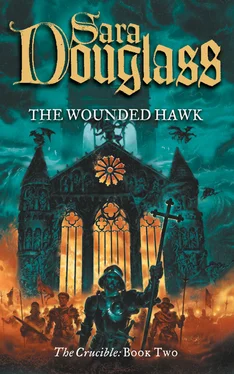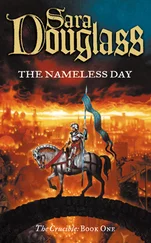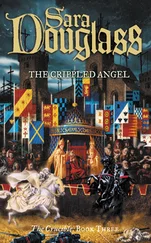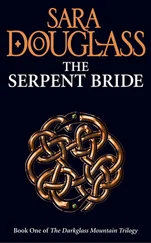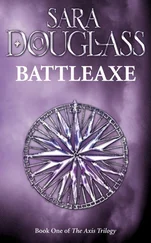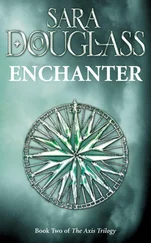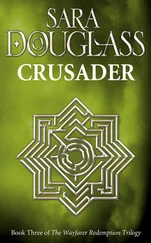His mother, his hateful mother, had never so publicly, nor so successfully, humiliated him. All those whispered rumours now being flung into his face with a devastating, ruthless candour.
He was the son of a peasant — how could anyone now gainsay it?
His eyes jerked to the treaty lying on the floor. All France — and England! — must be laughing at him. He trembled, and started to wring his hands. Every argument Joan had used to sustain his courage was lying on the floor along with that treaty … lying on the floor with his whore-dam’s laughter washing over it!
“Madam,” Joan said, glancing at Charles as she stepped forth. Her face was serene, but her demeanour was that of the stern judge. “It is you, not your noble son, who produces the stench in this hall. You lie for profit, and to further your own ambitions. Before God, you know it was Louis who fathered Charles on you. Admit it, or damn your soul.”
Isabeau’s haughty expression froze on her face. Her eyes widened, her mouth pinched, and her hands clenched at her sides.
She tried to stare Joan down, but the girl’s serene, confident gaze did not waver, and eventually it was Isabeau who looked away.
She saw that Charles was gazing at Joan with an expression almost of fear.
Useless, hopeless man, Isabeau thought. He wants nothing less than to believe me, not Joan. To believe Joan would mean he might actually have to do something about regaining his realm. No doubt he thought it would never go this far.
“Look at him,” said Isabeau softly. “How can anyone here believe he was sired by a noble father? He is the very image of wretchedness. How can you want him as your king?”
Having regained some of her courage, Isabeau looked back to Joan, who she saw was still wrapped in her damned self-righteous serenity.
“I swear to God, Joan,” Isabeau said, “that he must give you good satisfaction in your bedsport, for I cannot imagine why else you champion the cause of such a dullard.”
Joan smiled very slightly, very derisively, but it was Charles who finally found some voice.
“I have not touched her, madam!” he said, his voice horribly shrill. “Her flesh is sacred … I … I would not dare to touch her.”
“Are you telling me you haven’t slept with her?” Isabeau said, arching one of her eyebrows. “What ails you, boy?”
Charles’s hitherto wan cheeks now mottled with colour, his flush deepening as he saw every eye in the hall upon him.
His mother’s mouth curled mockingly.
“You must surely be weary after your journey,” Charles stammered, desperate to get her out of his presence. “Perhaps you should rest before our evening meal. Philip!”
Philip, King of Navarre, stepped forth from the huddle of nobles who had stood and watched open-mouthed through the entire scene. His dark, handsome face was reflective, but he smiled and bowed before Isabeau with the utmost courtesy.
“Perhaps you could provide my mother with escort to her chamber,” Charles said, and Philip smiled, and offered Isabeau his arm.
“Gladly,” he said.
As they left the hall Joan turned to Charles. “My very good lord,” she whispered urgently, “you must not believe what she says.”
“I am the get of a peasant,” he mumbled miserably, then looked around. “See? They all believe it!”
“The Lord our God says that you are the get of kings !” Joan said, exasperated with the witless man.
“I am worthless … worthless …”
Joan laid her hand on his arm—an unheard of familiarity, and not missed by some who watched—and leaned close. “You are the man who will lead France to victory against the cursed English,” she said, her tone low and compelling. “Believe it.”
Charles sniffed, staring at her, then looked about the hall.
One of the nobles stepped forth—Gilles de Noyes. “You are our very dear lord,” he said, and made a sweeping bow, “and we will follow you wherever you go. We know that your mother lies, for does not the saint by your side tell us so?”
One by one the others stepped forward and made similar assurances, and Charles finally managed to regain some little composure.
Joan smiled again at him, relaxing a little herself, and nodded her thanks to de Noyes.
De Noyes had, by now, thoroughly warmed to his theme. “My sweet prince,” he said, “you will be the one to lead us through fields of blood and pain and into victory!”
Fields of blood and pain? Charles swallowed, and then started as Joan leaned down, seized the Treaty of Westminster, and tore it to shreds.
Weary and sad at heart, Isabeau lay upon her bed and tried to dull her thoughts so that she could, indeed, sleep.
But this afternoon’s events kept sleep a long, long way distant.
Isabeau had thought that Charles would quiver and wail when presented with the treaty which formally bastardised him. Then, having seized the proffered escape, Charles would scurry away to whatever hidey-hole he found comfortable in order to avoid the laughter of his fellow Frenchmen.
True, Charles had quivered and quavered and flushed and wailed at the sight of the treaty and the sound of his mother’s derision … but he had not scurried away. And why not? Because that damned saintly whore had not allowed him to escape! He danced to her tune now … and that made Isabeau almost incandescent with rage.
How dare that peasant bitch control her son!
If it hadn’t been for Joan’s presence, Isabeau knew she could have persuaded Charles to stand aside from his pathetic fumble for the throne.
But, no, that damned saintly whore had shoved her Godly righteousness so far up his spine that Charles had actually managed to remain on his feet …
Sweet Christ Saviour. If Joan hadn’t been there, Isabeau knew Charles would have bolted for the door.
Whore! Isabeau had a great deal to lose if this treaty did not bring Richard the French throne, and she had the feeling that Richard would prove the most appalling of enemies should he be crossed.
And what of Philip? In the short while she had had to speak with him, Philip had appeared almost as seduced by the whore’s aura of saintliness as Charles was. But was that merely Philip’s wiliness, or was it true awe? Isabeau had known Philip a very long time, knew how he lusted for the throne of France as much as did the English king, and knew him for the conniving, treacherous bastard that he was.
Isabeau de Bavière had always liked Philip.
She sighed and then turned over, angry with herself that she could not sleep.
How could she convince Charles that he was, indeed, the son of a Master of Hawks? How could she undo him, and further her own cause?
Suddenly, all thoughts of Charles and Joan flew from her mind as, panicked, she lurched into a sitting position.
Someone had entered the room.
Isabeau squinted, damning the maid for closing the shutters against the afternoon light, and cursing her thudding heart for fearing the entrance of an assassin.
“Madam?”
Isabeau rocked with relief. “Catherine.”
Catherine walked into the chamber, and Isabeau slid from the bed, tying a woollen wrap about her linen shift. There was a fire burning in the hearth, and Isabeau indicated that they should sit on a chest placed to one side of its warmth.
For a minute or so she sat and studied her enigmatic daughter, knowing that Catherine was also using the time to study her.
Catherine. Isabeau had never quite known what to make of her … especially given the unusual circumstances of her conception. Catherine was not a beautiful woman in the same manner that Isabeau was, but she was striking nevertheless with her pale skin, dark hair and the blue eyes she’d inherited from her mother, and she had a form that most men would be more than happy to caress.
Читать дальше
